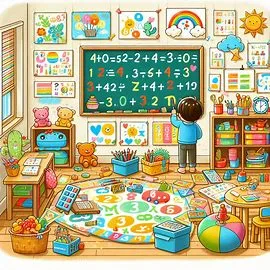Kindergarten maths is an important foundation for your child’s future learning and success. It covers a range of skills and concepts, such as counting, adding, subtracting, comparing, measuring, and more. In this blog post, you will learn what your child needs to know and how to help them master kindergarten maths.
What Your Child Needs to Know
According to the Australian Curriculum1, your child needs to know the following outcomes by the end of kindergarten:
- Count to and from 20 and order small collections
- Represent practical situations to model addition and subtraction
- Sort, describe and name familiar two-dimensional shapes and three-dimensional objects in the environment
- Use direct and indirect comparisons to decide which is longer, heavier or holds more, and explain reasoning in everyday language
- Answer yes/no questions to collect information and make simple inferences
These outcomes are aligned with the Early Years Learning Framework2, which emphasizes play-based learning and holistic development.
How to Help Your Child
There are many ways you can help your child learn and practice kindergarten maths at home and in everyday situations. Here are some tips and ideas:
- Use everyday objects and activities to teach maths concepts. For example, you can use toys, blocks, coins, buttons, or food to count, add, subtract, sort, and compare. You can also use clocks, calendars, scales, rulers, or measuring cups to teach time, date, weight, length, and volume.
- Play games and puzzles that involve maths skills. For example, you can play board games, card games, dice games, or dominoes that require counting, matching, or strategy. You can also play memory games, bingo games, or crossword puzzles that involve numbers, shapes, or patterns.
- Read books and stories that involve maths concepts. For example, you can read books like The Very Hungry Caterpillar3, Ten Apples Up On Top4, or The Doorbell Rang5 that involve counting, addition, subtraction, or sharing. You can also read books like The Greedy Triangle6, The Shape of Things7, or Sir Cumference and the First Round Table8 that involve shapes, geometry, or measurement.
- Use online resources and apps that support maths learning. For example, you can use websites like Khan Academy9, K5 Learning10, or IXL that offer free and interactive kindergarten maths lessons, worksheets, and games. You can also use apps like Math Kids, Monster Math, or SplashLearn that make maths fun and engaging for kids.
Kindergarten maths is a vital skill that your child needs to develop and master. It helps your child to understand the world, solve problems, and prepare for future learning. You can help your child by using everyday objects and activities, playing games and puzzles, reading books and stories, and using online resources and apps to teach and practice kindergarten maths.
We hope this blog post helps you to support your child’s kindergarten maths learning. If you have any questions or feedback, feel free to contact us. We are happy to help.


